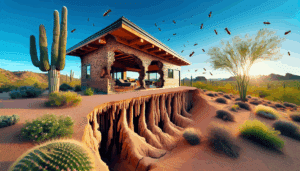Gardening is a beloved hobby for many homeowners, but the presence of termites can threaten not only your garden but also the soil in which your plants thrive. Termites are known for their voracious appetite for wood, but they can also impact your garden’s health. In this article, we’ll explore the relationship between termites and your garden and provide tips on protecting your plants and soil from these silent invaders.
Contents
The Garden-Threatening Behavior of Termites
While termites primarily feed on cellulose-based materials like wood, their activity can indirectly harm your garden:
1. Soil Disturbance
Termites build extensive underground tunnels, which can disturb the soil structure in your garden. This disruption may affect the root systems of your plants.
2. Moisture Attraction
Termites are attracted to moisture. If you have a garden with consistently damp soil, it can make your property more appealing to termites.
3. Mulch as a Food Source
Termites can consume mulch and other organic matter in your garden. If mulch is placed too close to your home, it can serve as a bridge for termites to access your property.
Tips for Protecting Your Garden
Protecting your garden from termites requires a combination of preventive measures and vigilance:
1. Maintain Distance
Keep mulch, woodpiles, and other organic matter away from the foundation of your home and garden structures. This reduces the risk of termites using them as entry points.
2. Soil Management
Regularly inspect your garden for signs of termite activity, such as mud tubes or damaged plants. Early detection is key to preventing extensive damage.
3. Proper Drainage
Ensure proper drainage in your garden to prevent excess moisture. Termites are drawn to damp soil, so addressing drainage issues can deter them.
4. Elevate Structures
If you have wooden garden structures like raised beds or trellises, consider elevating them off the ground. This can make it harder for termites to access the wood.
5. Use Termite-Resistant Materials
When constructing garden structures, opt for termite-resistant materials like cedar or redwood. These woods are naturally less appealing to termites.
6. Regular Inspections
Include your garden in your routine termite inspections by professionals like Arizona Termite Control Company. Inspectors can identify signs of termite activity in the garden.
7. Avoid Overwatering
Overwatering your garden can create a moist environment that attracts termites. Water your plants according to their specific needs, and avoid excessive moisture.
Eco-Friendly Solutions
Consider using eco-friendly termite control methods in your garden:
1. Beneficial Nematodes
Beneficial nematodes are natural predators of termites. They can be introduced into your garden to help control termite populations.
2. Organic Mulch
Opt for organic mulch options that are less appealing to termites, such as cypress or cedar mulch.
3. Natural Barriers
Create natural barriers around your garden using plants that termites find unattractive. Some options include marigolds, catnip, and mint.
In conclusion, termites can pose a threat to your garden and the soil in which your plants grow. By following preventive measures, practicing good garden management, and considering eco-friendly solutions, you can protect your garden from these silent invaders. For professional termite inspections and advice on protecting your garden, contact us today at 480-660-3093 or visit our website. Don’t let termites harm the beauty and health of your garden – take action to keep it thriving.




